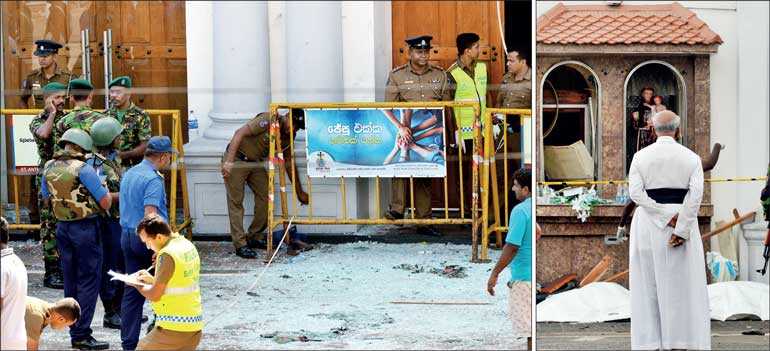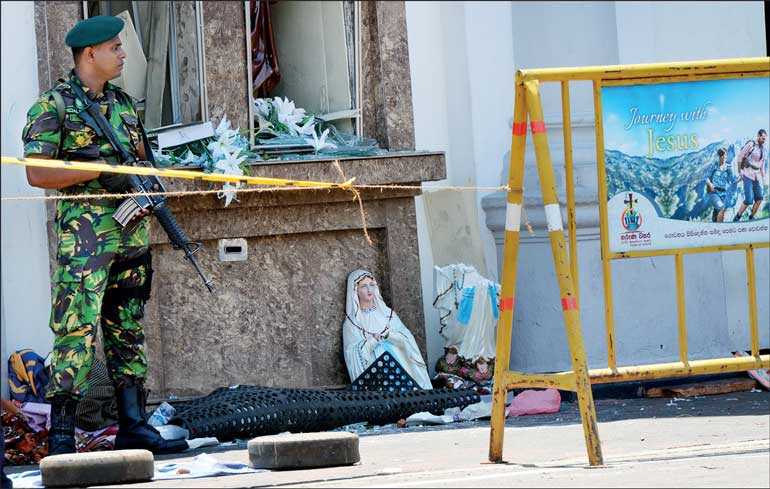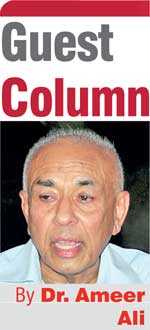Tuesday Feb 24, 2026
Tuesday Feb 24, 2026
Wednesday, 24 April 2019 00:00 - - {{hitsCtrl.values.hits}}


Never in the history of Sri Lanka has there been such a masterly engineered and flawlessly executed terror attack on soft targets to bring down a calamity of incalculable magnitude. These heartless and mentally deranged  criminals who masterminded this mayhem have no religion, no morals and not even an iota of love for humanity. They are the scum of society. The country and its people are obviously in a state of shock. It will take several more Easters and years to forget what had happened.
criminals who masterminded this mayhem have no religion, no morals and not even an iota of love for humanity. They are the scum of society. The country and its people are obviously in a state of shock. It will take several more Easters and years to forget what had happened.
Whether this infamy was totally home designed or planned abroad and executed by local hirelings, and whether it was a revenge attack for an earlier carnage inflicted on another entity by some foreign power or powers only time will tell. After all, terrorism is now a global phenomenon and no country is immune to it.
The Government of Sri Lanka with its intelligence and security departments will no doubt leave no stone unturned in investigating this heinous crime, and full force of the law must be brought to bear upon the criminals. In the meantime, the Government and Opposition should refrain from playing politics with the investigation and allow law enforcement to do its work without any interference.
To an outsider, the scale of this operation appears to carry all the hall marks of a foreign terrorist outfit. The initial investigation should start with the attack on a Methodist church in a remote village in Anuradhapura during the New Year celebrations. According to news reports that was carried out by a Buddhist mob. The question to be asked is whether that mob was acting on its own or at the instigation of or inducement by a third party. If a third party was involved then it would appear that that group intended to create a false Buddhist image for the attacks it was intending to carry out during Easter. The Anuradhapura incident must be investigated thoroughly.
Another line of inquiry should be to find out whether the Easter carnage has any link with ISIS or Al-Qaeda. The fact that no one has claimed responsibility so far does not allow one to dismiss the Middle East connection. More than one journalist from the Middle East was reporting that the ISIS has been dislodged but not entirely wiped out. It may be that President Trump was too quick to celebrate victory over ISIS and that US has once again blundered by allowing ISIS commanders and top soldiers to escape the net. That there were also Sri Lankans in the ISIS cadre is public knowledge. Earlier in Afghanistan, US allowed Al-Qaida to escape to Tora Bora caves, and today it is thriving in the conflict zones of the Middle East. Similarly ISIS must be using its local link to carry out a revenge attack in Sri Lanka. If this is the case then Sri Lanka has fallen victim to the geopolitical manoeuvres in the Middle East.
If the Middle East connection is established, then the next question is why choose Sri Lanka as target. The short answer is Sri /Lanka is extremely hospitable for visitors from the Middle East. Firstly, Sri Lanka’s links with Arab countries and particularly with Saudi Arabia have increased by several fold in recent times. Arab investments have been flowing inward, the number of Arab tourists have increased, Arab State officials have been frequenting on various missions and religious and cultural contacts between local Muslims and Arabs have increased. Also, Arab philanthropy has led to the growth of madrasas and other cultural centres. Given this cosy atmosphere it became easier for foreign cult leaders, religious preachers and even criminals to enter the island without raising local suspicion.
Secondly, the country’s entire attention at the moment is focused on the forthcoming elections. The Prime Minister and his Cabinet, the President and his party and the Opposition and its supporters are all fighting over nominations and electioneering tactics and no one seems to care about the security of the country. Even the security forces are more interested in protecting politicians than the country. If not why wasn’t action taken when warnings of an imminent attack came days ago?
Thirdly, the country is corrupt. It is easy for underworld leaders and terrorists to buy his/her way with money. How else can one explain the booming drug market in this country? Is it any wonder then that Sri Lanka has become the terrorist’s choice?
If there was no Middle East connection and the entire project was hatched and executed locally by the National Tawheed Jamaat (NTJ) as has been reported, are we to believe then that the Government and community leaders were totally unaware of its operation?
Whether NTJ is an off shoot of its parent Tawheed Jamaat (TJ), which has been in existence for years, or NTJ is entirely a new group, its activities could not have escaped the notice of All Ceylon Jamiyyatul Ulema (ACJU), SLMC and ACMC. The last two are in Government and they need ACJU support to win elections.
At least after the Mawanella bigotry Muslim community leaders should have been monitoring closely the growth of any extremist group and keep the authorities informed of its activities. The fact that they failed to do this is not surprising given the Government’s overall tolerance of politicised religions in the country. Religionised politics or politicised religion everywhere and at all times is a destroyer of peace especially in plural societies. It was S.W.R.D. Bandaranaike, the founder of SLFP, who resorted to drag Buddhism into the whirlpool of politics.
In fact, as Eugene Ford has shown in his ‘Cold War Monks’ (Yale University Press, 2017), it was after studying Sri Lanka’s experience in harnessing Buddhism to win political battles, as in the 1956 General Elections, that even the American CIA decided to politicise Buddhism internationally to fight against communism.
Although SWRD paid the ultimate price for his political stupidity, lessons were not learnt by his successors. The reckless use of religion in Sri Lankan politics has driven the country along a disastrous path, causing irreparable damage to the country’s pluralist make up. Successive governments have sacrificed one of history’s exemplary illustrations, i.e., Sri Lanka’s rich cultural and religious pluralism, at the altar of short-term electoral politics.
The Muslim community did not bring religion into politics until the formation of SLMC. The establishment of this party at a time when the Muslim world outside was experiencing a form of religious revival was rather unfortunate. Because, since then religious slogans and religious emblems began to inaugurate the opening and ending of every public gathering and decorate the platforms of SLMC. In the Tamil districts of the country, the ethnic challenge by the LTTE was met with religious response by SLMC. This Islamised politics had a snowballing effect and SLMC had to tolerate even Muslim groups with ultra-orthodox views.
When SLMC became a kingmaker after the 1990 General Elections, successive governments had to accommodate Islamised politics just as Sinhalese politicians continued to promote Buddhistised politics. Sinhalese leaders wanted the support of SLMC and ACMC, they in turn wanted the support of ACJU and ACJU covered every unsavoury element under its carpet. After 2009, when anti-Muslim riots broke out in Aluthgama, Ampara and Digana for example, no stern action was taken against the un-Buddhist elements who were behind those riots.
Once you allow one group to go unpunished in order to protect your vote bank, how can you punish another from a different group whose vote bank is also crucial to Muslim parliamentarians who are on your side? This is the tragedy into which Sri Lankan politics has been pushed into and the Easter carnage is the horrendous manifestation of national leadership’s grand failure.
The writing was on the wall at least since 2013 when ISIS inaugurated its caliphate. Even before that, and since the 1979 Iranian Revolution Islam had become the ‘master signifier’ in Muslim politics. However, ISIS added an extremely violent dimension to it. That was a warning for all plural societies to monitor the growth of Islamism and prevent its negative impact on national life.
The leaders of Sri Lanka cannot plead ignorance for their failure because ultra-conservative ideologies with detrimental effects to national peace and tranquillity were budding within the Muslim community and openly exhibiting their existence. Few intellectuals had warned about their activities and ideas in their writings and publications. Authorities seem to have ignored them, and innocent citizens are now paying the price for the rulers’ lethargy and indifference. These rulers are equally accountable as the manufacturers of this carnage.
It will take a long time to recover from the Easter mayhem. The economy is in peril. In the short run, law and order has to be restored and security forces should protect every citizen without showing any partiality. In the long run however, the country needs a radical leadership transformation to confront and tackle its complex problems. The current leadership has proved its incompetency in several fronts. Where is the alternative?
(The writer is attached to the School of Business and Governance, Murdoch University, Western Australia.)